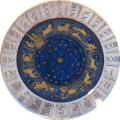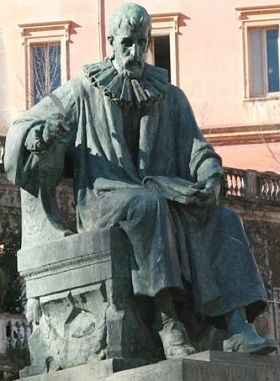365. Spirits in the Material World: Telesio and Campanella on Nature
Was the anti-Aristotelian natural philosophy of Bernardino Telesio and Tommaso Campanella the first modern physical theory?
Themes:
• B. Bondi (ed. and trans.), Bernardino Telesio: La natura secondo i suoi principi, con testo originale a fronte secondo l’edizione del 1570 (Milan: 2009).
---
• B.M. Bonansea, Tommaso Campanella: Renaissance Pioneer of Modern Thought (Washington DC: 1969).
• R. Bondí, Il primo dei moderni. Filosofia e scienza in Bernardino Telesio (Rome: 2018).
• G. Ernst, Tommaso Campanella: The Book and the Body of Nature (Dordrecht: 2010).
• J.M. Headley, Tommaso Campanella and the Transformation of the World (Princeton: 1997).
• G. Giglioni, “The First of the Moderns or the Last of the Ancients? Bernardino Telesio on Nature and Sentience,” Bruniana e Campanelliana 16 (2010), 69-87.
• C. Lohr, “The Sixteenth-Century Transformation of the Aristotelian Natural Philosophy,” in E. Kessler (ed.), Aristotelismus und Renaissance (Weisbaden: 1988), 89-99.
• G. Mocchi et al. (eds), Bernardino Telesio tra filosofia naturale e scienza moderna (Pisa: 2012).
• M. Mulsow, Frühneuzeitliche Selbsterhaltung : Telesio und die Naturphilosophie der Renaissance (Tübingen: 1998).
• L. Spruit, “Bernardino Telesio on Spirit, Sense, and Imagination”, in C. Lüthi et al. (eds), Image, Imagination and Cognition. Medieval and Early Modern Theory and Practice (Leiden: 2018), 94-116.
Stanford Encyclopedia: Tommaso Campanella
Stanford Encyclopedia: Bernardino Telesio







Comments
Montaigne
Hi, I've noticed in the previous episode and on the timeline that Montaigne's name doesn't show up. I was kind of looking forward to an episode on his "Essais". Could you explain why you've skipped him?
In reply to Montaigne by Ricardo
Montaigne
Not skipped at all! This series was only on the Italian Renaissance, the next one is on "the Reformation" but in practice that means philosophy around Europe apart from Italy in the 15-16th century. There will be a big chunk on France where Montaigne will definitely be included.
In reply to Montaigne by Peter Adamson
Oh right! Forgot this was…
Oh right! Forgot this was only Italian... How stupid of me!
Thanks for the answer
Two Book Theory Credit
I’m trying to figure out if I misunderstood something. Are you crediting Campanella with inventing Two Book Theory and that (paraphrased?) quote about it to him? I was trying to follow up on that because it’s the first I’ve heard the metaphor. But, that quote keeps being credited to Bacon (at least in part) and the theory going further back into unknown origins. Just trying to make sure I understood.
In reply to Two Book Theory Credit by Jason M
Two books
You mean the book of nature vs Scripture, right? No, that is absolutely not original with Campanella, sorry if I suggested that he invented it. It goes back into the medieval period, when the "book of nature" is a pretty common theme, often juxtaposed to Scripture. (Of course this also means it isn't Bacon's, unless you mean Roger Bacon as opposed to Francis, but I don't think he invented it either.)
Aristotle
But doesn't Aristotelic natural science draw those generalizations from empirical observation? If that's the case, Im not sure i understood what these authors started doing differently. If you could elucidate me that would be great. Love your podcast
In reply to Aristotle by Edgar
Renaissance physics vs Aristotle
Yes I think you are exactly right about that: as I tried to explain in this episode Telesio and Campanella were building on Aristotle as much as they were criticizing him, and their complaint is not that he failed to proceed empirically but that he reached the wrong conclusions with that method. As I point out in the Galileo episode the same goes for him, and that is why he claimed that he saw himself as an Aristotelian even at the end of his life. Looking forward we are going to see new ideas about how exactly empirical research works, like with the notion of introducing a hypothesis and testing it, and you can already see with Zabarella in this Renaissance series that ideas about empirical research were evolving within the Aristotelian framework. But ultimately I would see all that as refinement within the Aristotelian scientific program, at least to some extent - and whether a given thinker advertises him/herself as pro- or anti-Aristotle may be more a matter of rhetoric and social context than anything else.
Add new comment